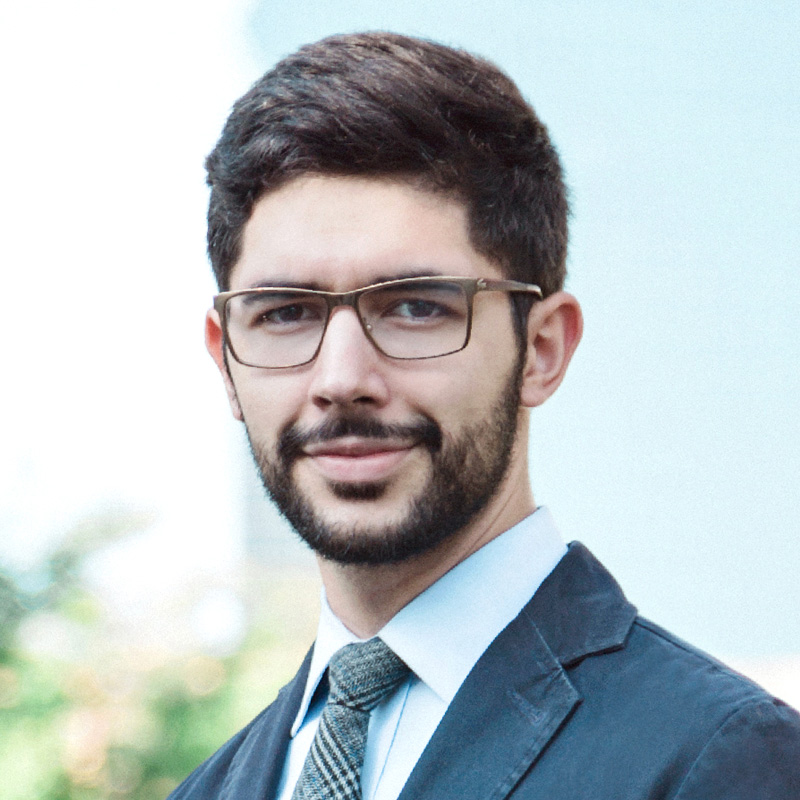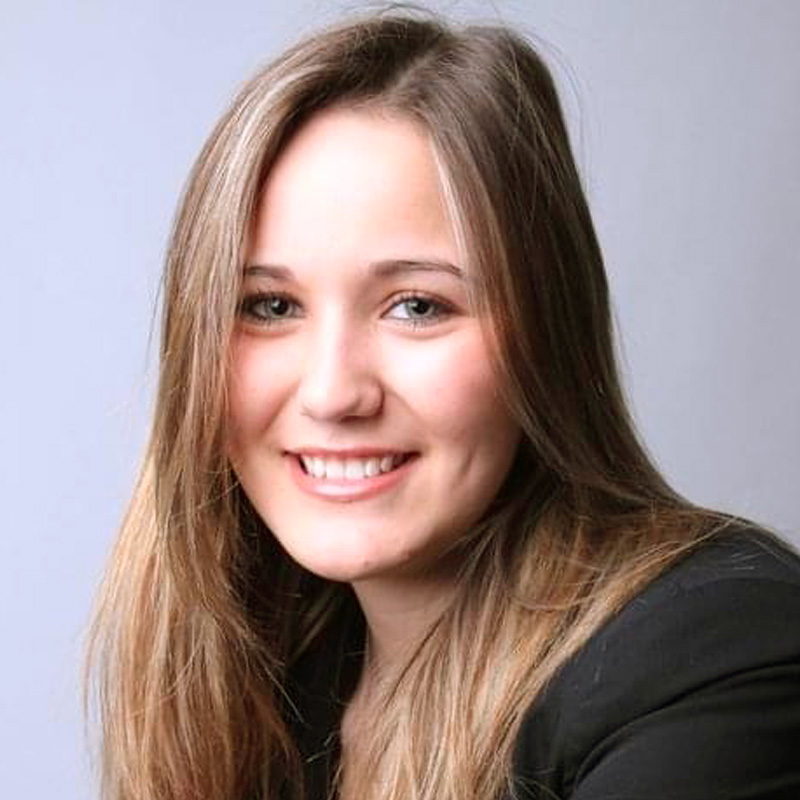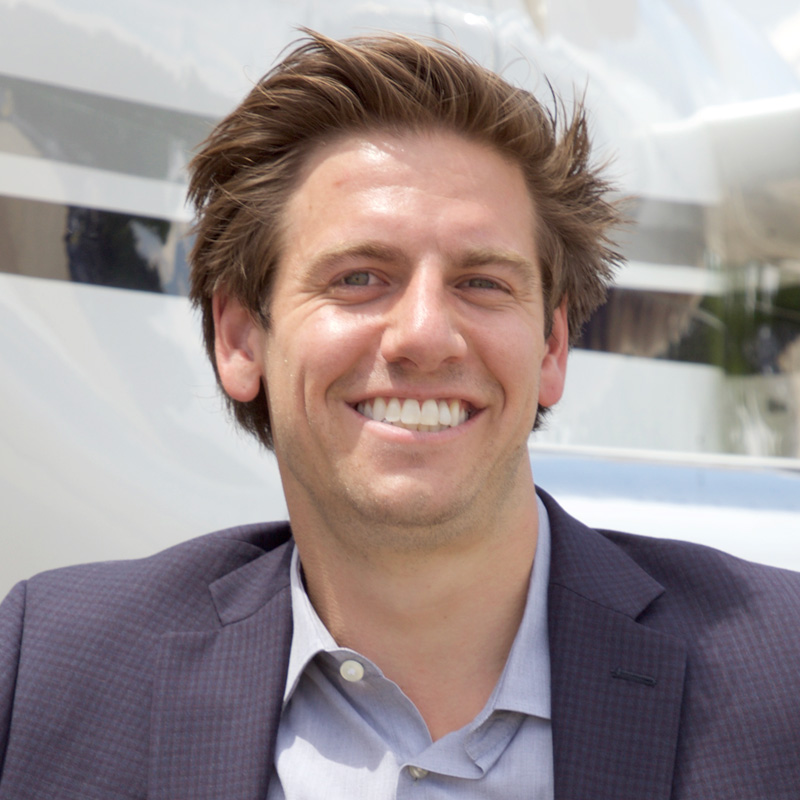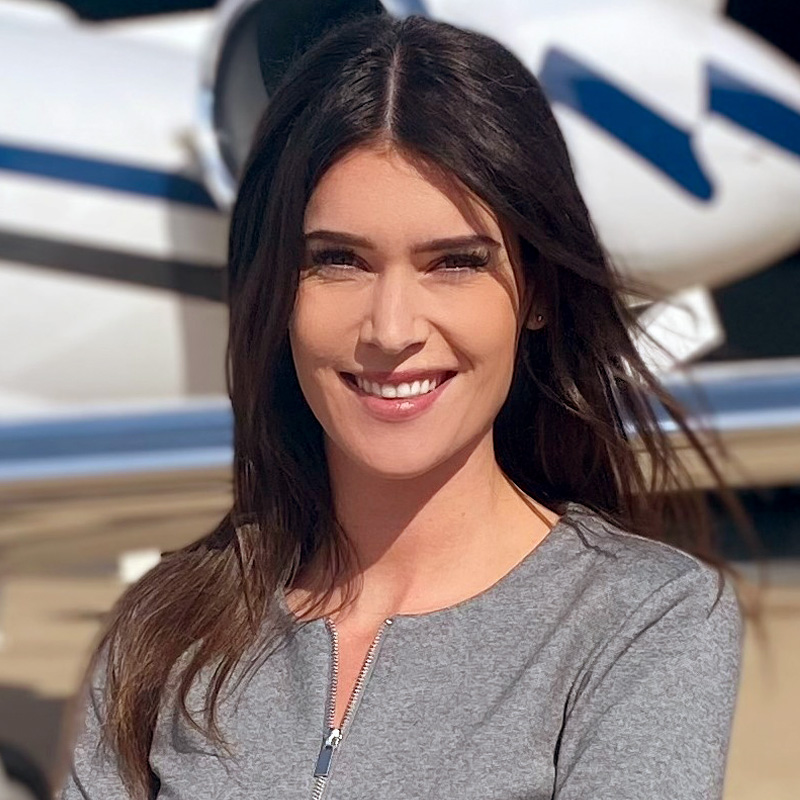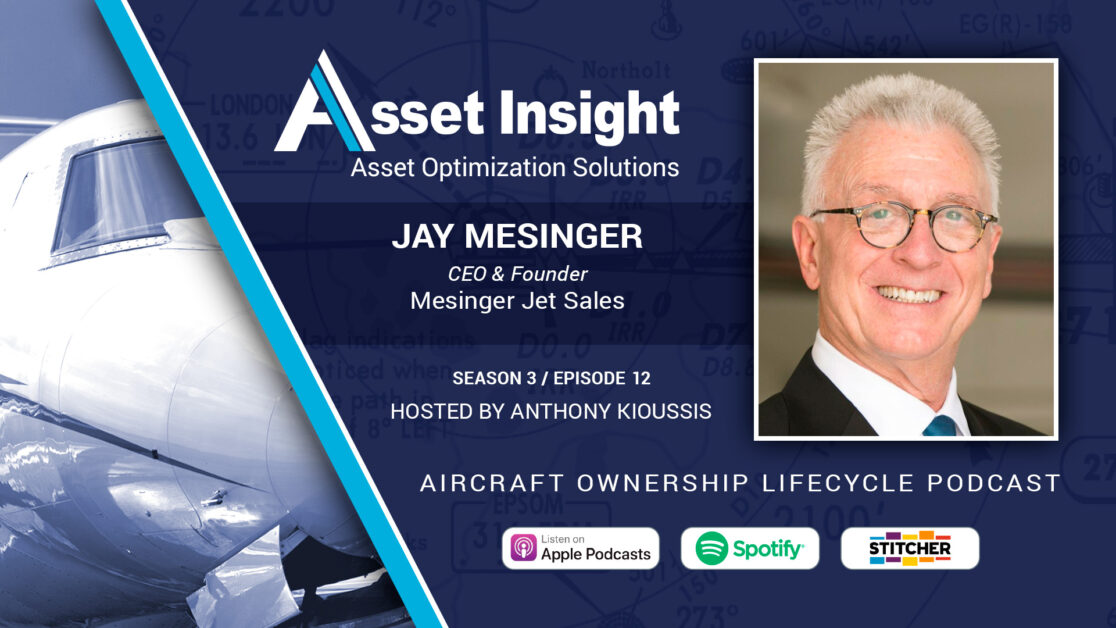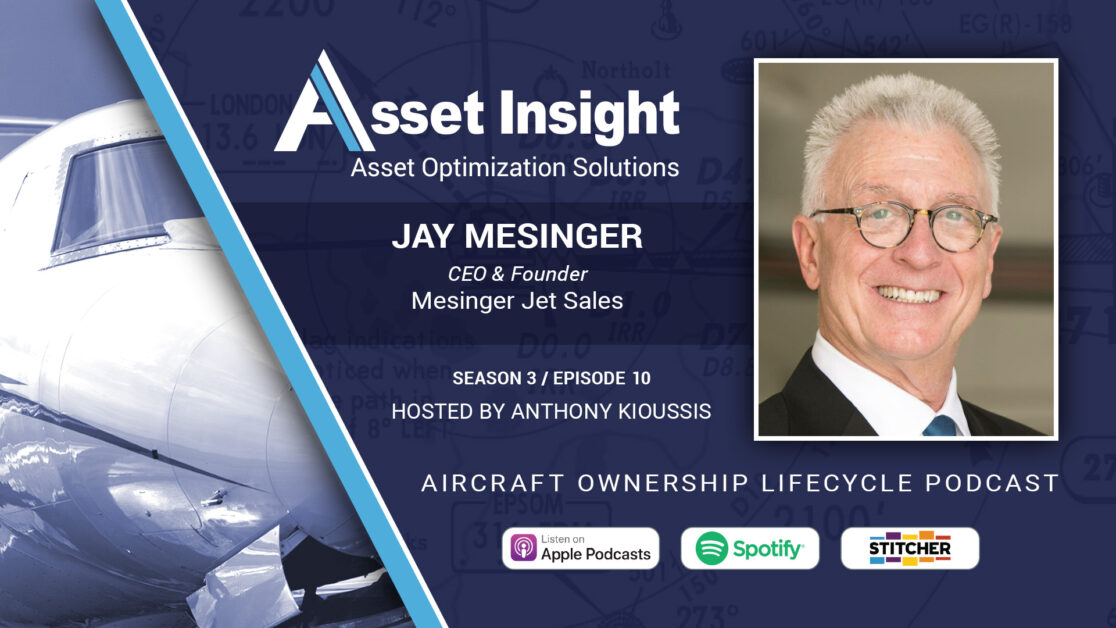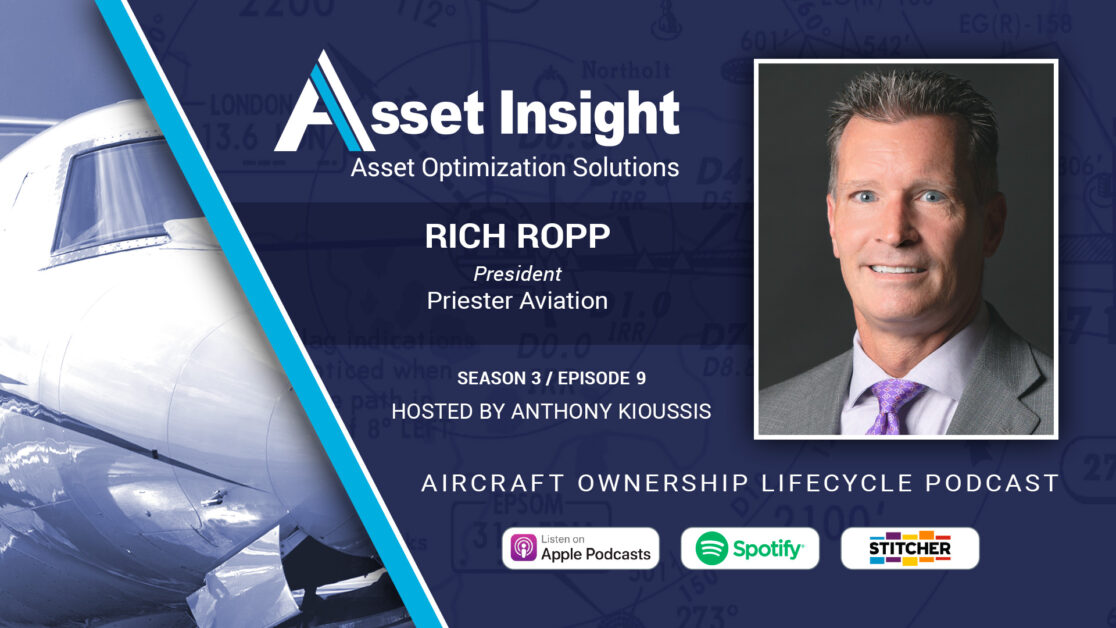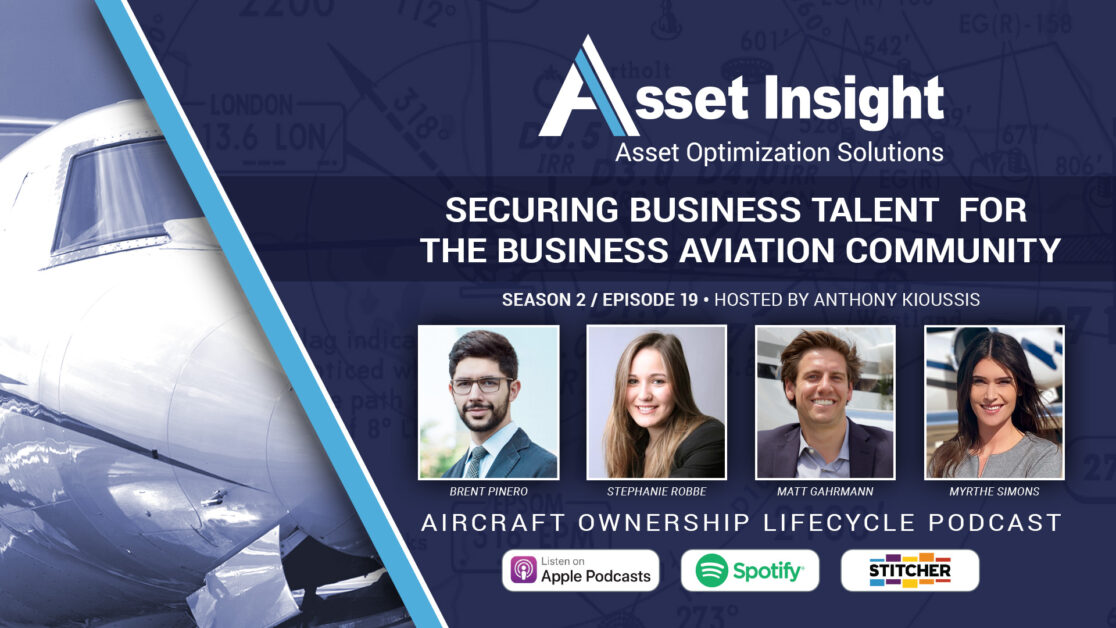
SEASON 2 • EPISODE 19
Securing Business Talent for the Business Aviation Community
How will the Business Aviation community secure young business talent – individuals with the baseline marketing, financial, and management skills they can fully develop and become Business Aviation’s future leaders?
To explore why some of the industry’s newest talent joined Business Aviation, the role they are currently playing within their organization, and what advice they might have for industry leaders, Asset Insight spoke with four individuals:
- Brent Pinero – Director of Market Intelligence, at Dallas Jet International;
- Stephanie Robbe – Marketing Officer, Business Aviation, Rolls-Royce North America;
- Matt Gahrmann – Executive Sales Director, Par Avion Ltd.; and,
- Myrthe Simons, Sales Operations Specialist, at Clay Lacy Aviation
About Brent Pinero
Brent holds a B.A. in Economics from the University of Texas at Dallas and has over five years of market research experience in multiple industries and disciplines.
Before entering the aviation industry, Brent worked as a policy researcher for the economic policy think tank the NCPA (National Center for Policy Analysis), where he researched and wrote for multiple scholarly papers regarding U.S. federal policy towards foreign economic development.
In addition to his work in academia, Brent has worked in the commercial real estate industry for four years as both a forecasting analyst and a financial analyst where he provided microeconomic and macroeconomic market analysis for a broad range of commercial real estate assets and markets.
Brent’s research tenacity and analysis capabilities give Dallas Jet International a leg up in the competitive business jet market place, enabling Dallas Jet to continually find the best aircraft in both price and quality for its clients.
About Stephanie Robbe
Stephanie Robbe currently serves as the Lead Marketing Officer for the Business Aviation organization at Rolls-Royce. She graduated with a degree in International Business from Florida Atlantic University and an M.B.A in Finance from Lynn University which has enabled her to serve as an influential driver of change within the aerospace industry.
During her time in business aviation, she has led the introduction of the pioneering sustainability program, SAFinity. SAFinity is a ground-breaking program designed to enable carbon-neutral flight by combining sustainable projects with a direct investment in SAF. In addition, she has had the unique opportunity to launch the most advanced business aviation gas turbines in the industry with the Pearl Family.
Prior to joining Rolls-Royce, Stephanie consulted for Aviation Week Network and led Sales & Business Development for media solutions and events in the North and South America territory. Stephanie brings with her a breadth of customer & strategy expertise with the proven ability to positively impact business revenue and performance while maintaining strong customer relationships.
Stephanie is currently a member of the Rolls-Royce Women Washington Chapter, IAWA (International Aviation Women Association), and NBAA Leadership council.
A native of France, Stephanie resides in Northern Virginia and enjoys running, reading mystery novels, and traveling the world to experience first-hand different languages and cultures.
About Matthew R. Gahrmann
Matt Gahrmann serves as the Executive Sales Director for Par Avion Ltd., an international business aircraft brokerage firm headquartered in Houston. He is based near Charlotte, North Carolina, and supports the company’s sales and acquisition of business for private aircraft clientele, and is responsible for new business development.
Prior to joining Par Avion, Gahrmann worked as a broker, project manager and analyst overseeing a large portfolio for a nationally known, multi-generational, private real estate equity investment firm. He brings in-depth experience in handling complex, capital-intensive projects that require great attention to detail and value analysis of build-to-suit development projects.
He is an experienced sales executive with an exceptional track record of closing multi-million-dollar transactions and understands how important it is to deliver unparalleled service to a very discerning clientele. His business acumen, attention to detail, and proven project management skills serve as assets to the firm.
Gahrmann graduated summa cum laude from High Point University in May 2016 with a Bachelor of Science degree in Business Administration and a Bachelor of Arts degree in Strategic Communication. He is currently pursuing a Master’s degree in Business Administration from the University of North Carolina, Charlotte.
About Myrthe Simons
Myrthe Simons holds the post of Sales Operations Specialist with Clay Lacy Aviation.
Acting as the Aircraft Manager and aviation expert for her customers and their organizations, Myrthe orchestrates a bespoke flight department experience, unique to each customer, through professional asset management and project planning that leverages the resources, safety systems and benefits of a global aviation management firm.
Myrthe began her career in aviation as an intern while completing her business degree, and is now enrolled in courses toward an MBA at Embry Riddle. Her devotion to serve and continually improve the aviation experience for her customers is what gives her energy.
Tony Kioussis (00:33):
Welcome to another Asset Insight podcast, covering the aircraft ownership life cycle. I am Tony Kioussis, president of Asset Insight and your host. There has been much discussion within the business aviation community on the need for pilots and technicians to support the industry’s unprecedented growth, a growth that is expected to continue for some time to come. Less discussion is taken place regarding how companies will seek out and encourage young business talent to join the industry, individuals with the baseline marketing, financial, and management skills they can fully develop and become business aviation’s future leaders. We thought it would be interesting to explore how and why some of the industries, young talent joined business aviation, the role they are currently playing within their organization and what advice they might have for current industry leaders on how to pursue and secure personnel with the necessary commercial or business related skills.
Tony Kioussis (01:34):
Following our conversations with four individuals, Brent Pinero, director of market intelligence at Dallas Jet International. Stephanie Robbe, marketing officer business aviation with Roll Royce, North America. Matt Gahrmann, executive sales director, Par Avion Limited. And Myrthe Simons, sales operations specialist at Clay Lacy Aviation. We think you will find their comments interest if not thought provoking. And in some cases, perhaps a bit surprising.
Tony Kioussis (02:12):
Brent Pinero serves as the director of market intelligence at Dallas Jet International, a well respected aircraft acquisition and sales consulting firm founded in 2012. Brent holds a bachelor of arts degree in economics from the university of Texas. Before joining Dallas Jet in 2018, Brent had numerous years of market research experience having worked as a policy researcher at the National Center for Policy Analysis, an economic policy think tank and within the real estate industry as both a forecasting and a financial analyst. Thanks for joining us, Brent.
Brent Pinero (02:50):
Thanks for having me. Happy to be here.
Tony Kioussis (02:52):
What was it about the business aviation industry that interested you enough to join the industry?
Brent Pinero (02:59):
That’s a really good question. And I think that can be answered in three parts. One, I think I had a desire to be in aviation, even when I was really young. I really wanted to be a fire pilot for a long time. In addition to that, when I was graduating from college with my degree, I was looking for industries that were going to be given an advantage through the new administration. This was right before President Trump got into office and I saw that he had several changes to the tax code. And one of them was directly benefiting business aviation, the 100% bonus depreciation advantage. And so I looked at that and I thought that this industry was primed to explode. And it definitely has over the last few years. And ultimately I’m a capitalist at heart and I thought that I could make a good bit of money working in this industry and working with luxury goods.
Tony Kioussis (03:47):
Describe the role a market researcher plays within the business aviation space and your company in particular.
Brent Pinero (03:54):
So a market researcher ultimately is I would say the backbone of the business aviation space in a lot of ways, especially in today’s day and age, data and information really are big drivers in a lot of different industries. And aviation is definitely one of those. So ultimately as a market researcher in this space, I think at a high level their job is to collect information about planes that are on the market that have sold and ultimately provide a direction for pricing and what types of aircraft brokers acquire for their clients. We are in kind of an on demand brokerage firm. A lot of other companies have market researchers who specify in one specific make and model or one specific make. So they would look specifically at Gulfstreams or Bombardier cetera, but we’re an on demand firm. So I effectively am in all the markets depending on what our clients need.
Tony Kioussis (04:46):
What does a typical day look like? And what is your favorite part of the function you play?
Brent Pinero (04:51):
In a typical day, I get up, drink coffee. I check all the major markets that we’re in. Right now, we’re in several Gulfstream markets and Bombardier markets. So I’ll check whether or not there have been any major changes to aircraft that are for sale, or if deal closed for an aircraft. And then a lot of the time I’m working on finding additional information to either evaluate an aircraft or find information to tell our clients how much they should bid on a specific aircraft. And that’s pretty much what I do most days. I do a little bit of report design, but as far as the whole of my job, day to day, I would say that those are the major things that I would do on a daily basis.
Tony Kioussis (05:30):
So what are the biggest obstacles you regularly face and how do you overcome them?
Brent Pinero (05:36):
Well, I would say the number one biggest obstacle that you face as a market researcher, especially in a luxury good market, such as aviation is privacy and a lack of disclosing information. Because a lot of the time there’s nondisclosure agreements involved and pricing isn’t exactly readily available, which is why the second aspect I think, that’s really important for a market researcher who is looking to get into this industry is to understand this is a lot more than using a data platform like JETNET or AMSTAT. It really is about cultivating relationships with other brokerages so that you can collectively benefit each other and help each other, understand where the market is going and ultimately what an aircraft is worth.
Tony Kioussis (06:17):
What are some of the misconceptions about the market researcher’s role?
Brent Pinero (06:20):
I think that one of the big misconceptions about the market researcher’s role is effectively that we’re just number crunchers. It actually ends up being a lot more than just looking at numbers on a page in Excel and calculating what something is worth. You really do have to understand how aircraft work, what is the purpose that your client is going to be using the aircraft for and ultimately what their budget is in order to truly understand where you should be directing them and the brokers for your company as far as aircraft that are available and the best fit. So it really isn’t just crunching numbers behind the scenes. You have to be involved in the sales process to really do a good job.
Tony Kioussis (06:59):
Tell me, where do you see the business aviation market going? And what should business aviation leaders do to attract young people to the business side of the industry?
Brent Pinero (07:09):
Yeah, I’ll answer those separately. The first with where the business aviation market is going. I’d say that as we go towards the end of the year, we’re definitely seeing an increase in prices, just because of a lack of inventory, everyone is struggling to find aircraft that’ll fit their specific requirements. And I think that’ll definitely continue into next year. There’ll probably be a lull in the first couple of months of 2022, just because most people will have bought their aircraft to try and take advantage of year end tax benefits. But I can see it continuing in this same pattern unless we see an influx of new aircraft available for sale, which at this point seems unlikely. I think we’re going to see prices continue to rise at least in the next six months.
Brent Pinero (07:52):
And what should business aviation leaders do to attract young people? I think there are a couple of different answers to this and ultimately it just depends on the type of company that you run. But I think one big thing is flexibility that a lot of young people are looking at. People who are gen Z, millennials are looking at flexibility in the job. Ultimately being able to have a decent work, life balance, but ultimately proving to young people that this is a industry in which they can grow and they can find additional careers after they do this. Because traditionally the market research role is one of the introductory roles into the business aviation industry. You start as a market researcher, you understand how markets work and then you graduate to being either a sales engineer or a broker. So really conveying to young workers in today’s environment that there is room to grow and that this industry is no longer just a good old boys club.
Brent Pinero (08:46):
But in fact it does have a lot of young talent that are going to be driving this and also conveying that there is a lot of room to distinguish themselves. In an industry as old as aviation, there are a lot of opportunities to advance projects in the industry itself using technology. And I think that young people are really good with that. So I would say that those are some of the major ways to attract young people to this industry. And also looking outside of aviation degrees. A lot of people with economics degrees and finance degrees are poised to do this job well because they’re taught to look at markets, they’re taught to analyze markets and ultimately create real world direction from those. So looking in the right places, providing the growth, and ultimately providing flexibility for younger workers, I think is some of the more important things that business aviation leaders should be looking at to attract young people.
Tony Kioussis (09:41):
Stephanie Robbe is the lead marketing officer for the business aviation organization at Rolls Royce North America. Stephanie holds a degree in international business from Florida Atlantic University and an MBA in finance from Lynn University. Prior to joining Rolls Royce, Stephanie consulted for Aviation Week Network and led sales and business development for media solutions and events within North and South America. Thanks for participating on this podcast, Stephanie. Tell us why business aviation interested you sufficiently to join the industry?
Stephanie Robbe (10:18):
Thank you for having me. I grew up in France and I was always around the industry since my dad was an engineer and worked for Dassault for many, many years. And after I graduated with my bachelor, I naturally landed into the industry where I worked on the emerald side, mainly on the airlines. And I eventually went to few [inaudible 00:10:43] event and it just clicked. I was immediately impressed with how unique the side of the industry was. Not only we worked with the time machine, but we have the chance to collaborate with inspiring people and cutting edge technology to create the product of tomorrow.
Tony Kioussis (11:00):
Describe the role you play as a marketing officer for Rolls Royce’s business aviation organization.
Stephanie Robbe (11:07):
I oversee the marketing for business aviation globally, meaning that I am in charge of our internal and external strategy for current and future programs as well as responsible for anticipating and satisfying customer’s requirement to help increase the civil aerospace aftermarket product and services sales.
Tony Kioussis (11:29):
How does your formal education and experience prior to your current role benefit Rolls Royce?
Stephanie Robbe (11:36):
From the time I was a kid growing up around the industry and attending the Paris Air Show, I was always fascinated by aviation and always wanted to work in the industry. I think my passions for the industry, that most uniquely qualifies me. I don’t just see my work as a job, but I see it as having the ability to do what I love the most every day. I’m also very fortunate to be able to attend trade shows where I can use some of my skills to actually communicate with customer, meet with our leadership and interact on a daily basis with our product and services.
Tony Kioussis (12:13):
What have been some of the unexpected challenges as a consequence of your responsibilities?
Stephanie Robbe (12:15):
COVID of course, was an unexpected challenge for everyone across all of the industry. For me, in particular, this meant dropping my normal task and immediately thrusting myself into the market analysis. The key point that everyone wanted to understand immediately was one, the impact of COVID on the engine flying hours and two, when will the flying hours recover? Neither of the two question were really easy to answer, but I dived into it and helped develop a platform for us to monitor this trend and to help the business understand the impact and drive critical decision making from this, for our leadership to look further.
Tony Kioussis (13:00):
For someone like yourself, your background, your interests, where do you see the opportunity for growth within business aviation?
Stephanie Robbe (13:09):
The growth in business aviation is going to come from understanding our audience needs. One of those key needs is the drive towards carbon neutrality. Our leaders today have made tremendous strides to lay down the foundation. I look forward to bringing their vision to life as we move into an age of environment consciousness.
Tony Kioussis (13:29):
What should business aviation leaders do to attract talented young people to the business side of the industry?
Stephanie Robbe (13:36):
I expect that business aviation market will continue to see a positive growth well beyond where we were before COVID. We need to continue to look for innovative minds, but I think it’s important that we get away from an engineer only approach and ensure that we are attracting a diverse workforce that can pave a positive and sustainable impact for our wonderful industry.
Tony Kioussis (14:05):
Matthew Gahrmann recently joined Par Avion Limited, an international business aircraft acquisition and marketing firm headquartered in Houston. In his role of executive sales director, Matt is responsible for new business development. Prior to joining Par Avion, Matt worked as a broker, project manager, and analyst overseeing a large portfolio for a nationally known private real estate equity investment firm. Based on the complexity involved in researching and analyzing business aviation client requirements, we asked Matt to elaborate on how his previous experience will aid him and Par Avion’s clients in his current role. Thanks for joining us, Matt. Let’s start off with what drew you to the business aviation industry?
Matt Gahrmann (14:55):
Certainly. Thank you for having me on. I appreciate the opportunity. So I’ve always followed aviation as I was lucky enough to be introduced to Par Avion from a really young age. I’ve had the privilege of knowing Janine Iannarelli and therefore being exposed to the industry my entire life. So I’ve always had an appreciation for what aviation provides, which to me is an unparalleled level of freedom of movement in really the most efficient way that’s currently possible. And of course, living in North Carolina first in flight, always rings a bell.
Tony Kioussis (15:27):
Describe your roles, responsibility at the company.
Matt Gahrmann (15:31):
So my core responsibilities is focused on the sales and acquisition of business and private aircraft, including new business development. So that could include anything from market research, lead generation. And then of course, client representation. It really is an all encompassing role that involves sales, marketing, support services, and anything else that Par Avion may offer.
Tony Kioussis (15:51):
How do you think your experience and skillsets fit within the industry? How will your skills benefit Par Avion’s clientele?
Matt Gahrmann (15:59):
Certainly. So I have a previous core focus in commercial real estate investment equity as you mentioned. I understand both the diligence required to close a transaction and also corollary protect the client’s interests. Both real estate and aviation have a similar client base and many successful real estate firms even utilize private aviation. So the two really compliment each other well.
Tony Kioussis (16:21):
I realize you’ve only been in your role for a short period of time, but what do you see as you look out at the business aviation industry?
Matt Gahrmann (16:30):
I see continued growth, however, peril to that recognizing environmental responsibility. So as lifestyles have shifted, especially due to the recent global pandemic, traditional means of travel have grown additionally, more inefficient and less reliable with canceled flights, more downtime, hotels, increased costs, et cetera. Both employees and executives alike have an enhanced appreciation for safety and work, life balance. And that’s what private aviation promises. That being said, private aviation certainly isn’t the most environmentally friendly means of transportation. So when news such as Jeff Bezos flying his jet to the United National Climate Change Conference surfaces, it can cast a sour impression on the industry to others.
Matt Gahrmann (17:13):
This is further shown by his recent pledge of $2 billion to battle climate change. And while some may say that’s reactionary, I think that that highlights the direction that the aviation industry is likely going to be pushed towards. It’s just being more environmentally conscious and using more environmentally friendly means such as sustainable aviation fuel. However, with this focus on sustainability, this could also put pressures on the fuel industry to bring the cost down more relative to typical jet fuels. If that were to happen I think that there is an opportunity to improve public image on the private jet industry. Whereas you have both the fuel manufacturers making a conscious effort to bring those costs down and have a lower environmental impact as well as operators to utilize that fuel and in making it more economically feasible would help everyone.
Tony Kioussis (18:06):
Let’s talk a bit about your career. How do you see your future developing within business aviation?
Matt Gahrmann (18:12):
So I’m lucky enough to be able to stand alongside Janine Iannarelli and she’s been in the industry about 35 years and certainly is recognized as an industry leader. And so I would love to continue standing alongside of her and build that reputation on my own to be recognized as such a leader as her. I think that long term, my personal goal is to continue expanding within Par Avion and then also assist in growing the Par Avion team at the right time.
Tony Kioussis (18:40):
Like every other industry, business aviation is interested in engaging and retaining talented people. What would you tell listeners among whom are business aviation leaders about what to do to attract young people to the industry specifically on the commercial side of the business?
Matt Gahrmann (18:59):
I can relate it to myself and what drew me to the industry. I fall back on the saying of who you surround yourself with is who you become. So not only surrounding myself with someone such as Janine, but also wanting my interest, which the clientele that pushed me to be my best self, and then likewise would push somebody to be his or her best self. That includes constant networking, constant dialogue. And that dialogue you’re having is going to be with successful individuals, which will hopefully lead to a lifetime of success.
Tony Kioussis (19:32):
Myrthe Simons holds the post of sales operation specialist with Clay Lacy Aviation. Acting as the aircraft manager and aviation expert for her customers and their organizations, Myrthe orchestrates a bespoke flight department experience unique to each client through professional asset management and project planning that leverages the resources safety systems and benefits of a global aviation management firm. Myrthe began her career in aviation as an intern while completing her business degree and is now enrolled in courses toward an MBA at Embry-Riddle. Thank you for joining us Myrthe. Tell us what inspired you to join the business aviation community.
Myrthe Simons (20:14):
Thank you for having me. I fell into business aviation really. So I was on a quest to find an internship to complete my business degree at the University of Texas of Dallas. And I just happened to speak to a friend of mine who is the chief technology officer at Clay Lacy. And that’s how I started my career in business aviation.
Tony Kioussis (20:35):
Describe your responsibilities at Clay Lacy Aviation.
Myrthe Simons (20:39):
My job is a really fun mix of responsibilities. As a sales operations specialist, I’m constantly trying to find new ways to help our sales organization basically run more efficiently. So that is CRM database management and maintenance. It is finding new technical sales enablement programs and systems, and it’s just making the sales process more efficient for our customers and our sales force. And as an aircraft manager, I am part of the fractionalized flight department that we built for each of our owners. So I am their single point of contact, kind of the conduit for information flowing to and from all the other members in the flight department. That’s maintenance personnel, it is flight crew dispatchers and financial analysts. We often use the analogy of orchestra and as the aircraft manager, you are the conductor of an orchestra made up of aviation professionals like I mentioned, that each contribute to the symphony that is a well run operation.
Tony Kioussis (21:46):
How has your previous training be it your college education or earlier business experience help in your current role and benefit Clay Lacy?
Myrthe Simons (21:56):
I worked in the retail and restaurant industry for over a decade prior to entering aviation. And throughout my high school and college days, I was never sure what I wanted to do. I mean, I always loved working with people, preferably in a team. I loved collaborating and just making genuine connections with the people that I work with. I think that is the attitude that has helped me so far. And I think this is especially applicable to aviation because in order to learn and get better at what you do, you have to rely on the people that have been doing it for years to teach you. Having a humble approach, know what you don’t know, but being hungry for learning more, being willing to listen and learn from the veterans in the industry. I mean, that’ll get you really far.
Tony Kioussis (22:46):
What have been some of the unexpected challenges you faced as a result of your role?
Myrthe Simons (22:51):
You know this is a really complex industry. It’s subject to many federal laws and regulations. As far as I know, there’s just no aviation for dummy’s book out there. And if there is, I’d like to get a copy. It’s a very complex thing operating aircraft. So almost everyday you’ll run into a new obstacle. It’s either a question that you don’t know the answer to yet. It’s either something really technical. It’s just not in your domain, but that’s also the fun part, is just figuring out how to solve that puzzle every single time. This is where the teamwork comes in and you need to have an ability to collaborate with all the other people in our company. You’re backed by hundreds of aviation professionals with decades of experience and working together to find a solution.
Tony Kioussis (23:43):
Tell me, what are some of the growth opportunities you see for yourself within business aviation, given your education and your skillsets?
Myrthe Simons (23:52):
I see a very bright and exciting future. What I like about being an aircraft manager is just that the service aspect and making the ownership experience memorable one. And secondly, I just like that you get to learn about so many different facets of the industry. Every day you learn a little bit more about a lot of things and you have resources available to learn as much as you want. I see myself continuing to work with aircraft owners as an aircraft manager for probably the next five, maybe 10 years. And who knows. There’s so many other opportunities in this industry. I’m definitely planning on staying in it.
Tony Kioussis (24:30):
What advice would you give to business aviation leaders to help them attract talented young people to the business side of our industry?
Myrthe Simons (24:39):
First of all, I think that we’ve all gotten to the point where if we hear 2020 has been challenging, we all kind of flinch. So I’m excited that we’re all looking ahead. And I think as difficult as it has been, it also created new opportunities or better yet accelerated them. We are seeing more new aircraft owners than ever. And I can’t tell you how rewarding it is to see new aircraft owners return from that first flight. And just the look on their faces. You see that the experience has lived up to all of their expectations. But to your point about how do we get new talented people to enter this industry, I can tell you that I personally had never even considered this is aviation because I had simply never been exposed to it. I have no aviators in my family. I didn’t go up close to an airport.
Myrthe Simons (25:28):
The typical, how did you get into aviation stories just didn’t apply to me. For me it took an evangelist like Brad, the man who introduced me to give me that opportunity. The moment that I had that aha moment, I became an evangelist myself. Now I try and encourage a lot of people in my network to consider a job in business aviation. But there’s just not enough awareness, I think. Branching out and doing that community outreach at colleges and high schools, job fairs to introduce people to and excite people about all the jobs that are available that make this industry run. In a way it’s kind of its own little microcosm and all the more traditional jobs are also needed in aviation. I think a lot of community outreach and I really like to be a part of that.
Tony Kioussis (26:20):
This has been another Asset Insight podcast covering the aircraft ownership life cycle. Please visit our ever-growing podcast library at assetinsightpodcast.com and select from any number of topics discussed with business aviation industry experts. This is Tony Kioussis and as always, thank you for listening.
Don’t forget to share this podcast!
